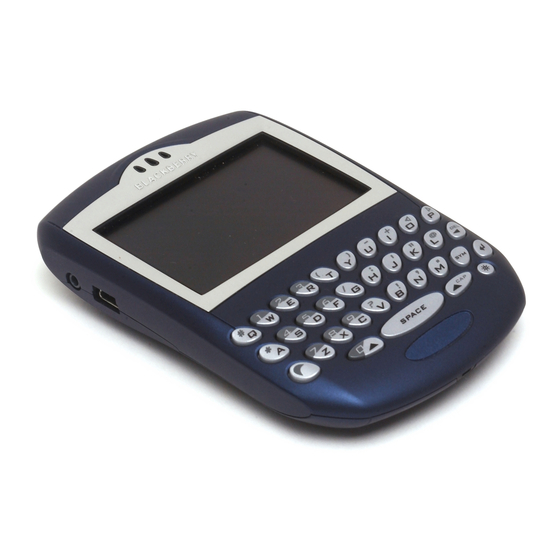Blackberry 7290 WIRELESS HANDHELD - SAFETY AND Informasi Produk - Halaman 7
Jelajahi secara online atau unduh pdf Informasi Produk untuk Ponsel Blackberry 7290 WIRELESS HANDHELD - SAFETY AND. Blackberry 7290 WIRELESS HANDHELD - SAFETY AND 10 halaman. Blackberry internet service user guide
Juga untuk Blackberry 7290 WIRELESS HANDHELD - SAFETY AND: Informasi Keamanan dan Produk (10 halaman), Panduan Memulai (11 halaman), Panduan Memulai (28 halaman), Panduan Pengguna (9 halaman)

The BlackBerry Wireless Handheld is a radio transmitter and receiver. It is designed and manufactured
not to exceed the emission limits for exposure to radio frequency (RF) energy set by the Federal
Communications Commission (FCC) of the U.S. Government, Industry Canada of the Canadian
Government (IC), and recommended by The Council of the European Union. These limits are part of
comprehensive guidelines and establish permitted levels of RF energy for the general population. The
guidelines are based on standards that were developed by independent scientific organizations
through periodic and thorough evaluation of scientific studies. The standards include a substantial
safety margin designed to assure the safety of all persons, regardless of age and health.
The exposure standard for wireless mobile handhelds employs a unit of measurement known as the
Specific Absorption Rate, or SAR. The SAR limit set by the FCC/IC is 1.6W/kg*. The SAR limit
recommended by The Council of the European Union is 2.0W/kg**. Tests for SAR are conducted using
standard operating positions specified by the FCC/IC with the handheld transmitting at its highest
certified power level in all tested frequency bands. Although the SAR is determined at the highest
certified power level, the actual SAR level of the handheld while operating can be well below the
maximum value. This is because the handheld is designed to operate at multiple power levels so as to
use only the power required to reach the network. In general, the closer you are to a wireless base
station antenna, the lower the power output.
Before a wireless handheld model is available for sale to the public, it must be tested and certified to
the FCC, IC, and The Council of the European Union that it does not exceed the limit established by the
government-adopted requirement for safe exposure under the recommendations of the International
Commission on Non-Ionizing Radiation Protection (ICNIRP). The tests are performed in positions and
locations (for example, at the ear and worn on the body) as required by the FCC, IC, and The Council of
the European Union for each model.
The highest SAR values for each handheld model when tested for use at the ear is outlined below:
BlackBerry 7290 Wireless Handheld™
The highest SAR values for each handheld model when worn on the body, in an approved holster or
carrying case, is outlined below:
BlackBerry 7290 Wireless Handheld™
Body-worn measurements differ among wireless handheld and phone models, depending upon
available accessories and FCC, IC, and The Council of the European Union requirements. While there
may be differences between the SAR levels of various wireless devices and at various positions, they all
meet the government requirement for safe exposure.
The FCC has granted an Equipment Authorization for this model handheld with all reported SAR
levels evaluated as in compliance with the FCC RF emission guidelines. SAR information on this model
handheld is on file with the FCC and can be found under the Display Grant section of http://
www.fcc.gov/oet/fccid after searching on FCC ID L6ARAP40GW (BlackBerry 7290). Additional
information on Specific Absorption Rates (SAR) can be found on the Cellular Telecommunications &
Internet Association (CTIA) web-site at http://www.wow-com.com.
___________________________________
* In the United States and Canada, the SAR limit for mobile handhelds used by the public is 1.6 watts/
kg (W/kg) averaged over one gram of tissue for the body or head (4.0 W/kg averaged over 10 grams of
tissue for the extremities - hands, wrists, ankles and feet). The standard incorporates a substantial
margin of safety to give additional protection for the public and to account for any variations in
measurements.
Handheld
Handheld
Safety and Product Information
1 g / 10 g SAR (W/kg)
0.31/0.24
1 g / 10 g SAR (W/kg)
1.38/0.88
7
